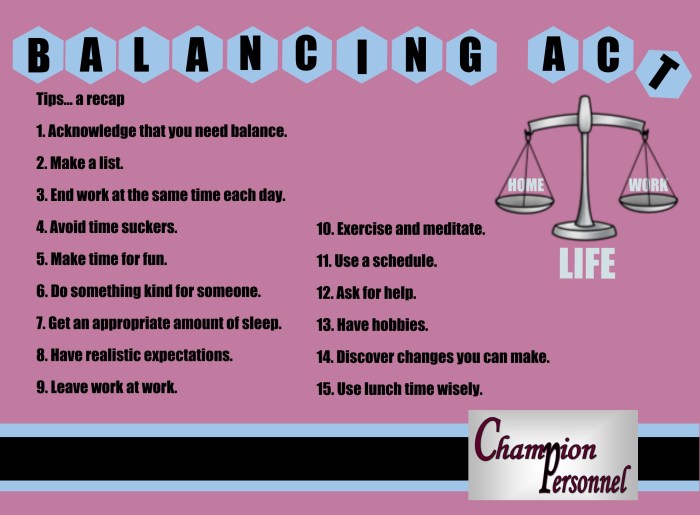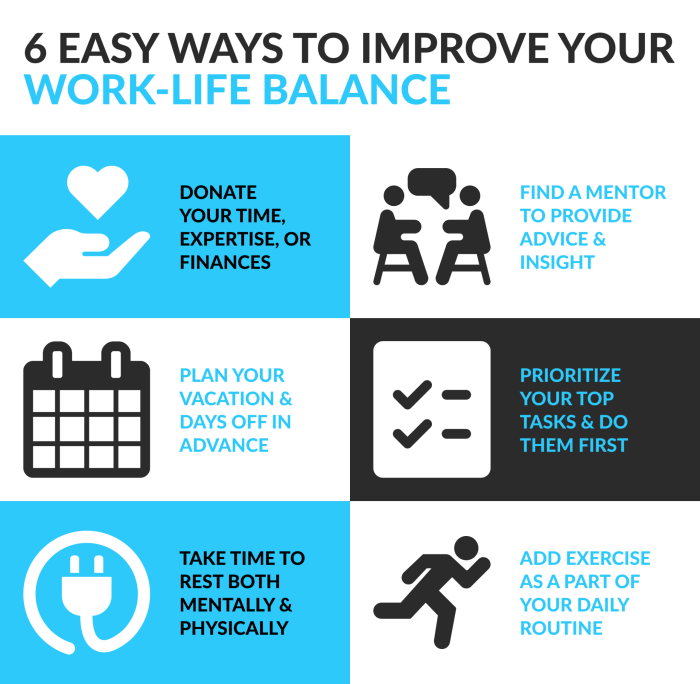Work-life balance tips are crucial for maintaining a healthy lifestyle. From time management techniques to setting boundaries, this guide will help you achieve the perfect balance.
Learn about the importance of work-life balance, effective strategies for achieving it, healthy work habits, and creating a supportive work environment.
Importance of Work-Life Balance

Work-life balance is crucial for overall well-being as it helps individuals maintain a healthy lifestyle by managing their professional responsibilities and personal life effectively. It ensures that people do not neglect their mental, physical, and emotional health while striving for success in their careers.
Benefits of Work-Life Balance
- Reduced Stress Levels: Balancing work and personal life can help lower stress levels, leading to better mental health and overall well-being.
- Improved Productivity: When individuals have time to relax and recharge outside of work, they are more productive and focused during work hours.
- Better Relationships: Maintaining a work-life balance allows individuals to spend quality time with family and friends, strengthening relationships and support systems.
Positive Impact on Mental Health
- Enhanced Mental Resilience: Work-life balance provides individuals with the opportunity to rest and rejuvenate, increasing their mental resilience to cope with challenges.
- Reduced Burnout: Avoiding overwork and burnout by prioritizing personal time can prevent mental exhaustion and improve overall mental health.
- Increased Happiness: Finding a balance between work and personal life leads to greater satisfaction and happiness, contributing to positive mental well-being.
Strategies for Achieving Work-Life Balance
Achieving work-life balance is essential for overall well-being. It involves effective time management, setting boundaries, and prioritizing tasks to ensure a healthy balance between work and personal life.
Time Management Techniques, Work-life balance tips
Effective time management is crucial for balancing work and personal life. Here are some techniques to help you manage your time efficiently:
- Use a calendar or planner to schedule tasks and appointments.
- Set realistic goals and deadlines for your work and personal projects.
- Prioritize tasks based on importance and deadlines.
- Avoid multitasking and focus on one task at a time to improve productivity.
Setting Boundaries
Setting boundaries between work and personal time is key to maintaining a healthy work-life balance. Here are some tips to help you establish boundaries:
- Define specific work hours and stick to them to avoid overworking.
- Turn off work notifications outside of work hours to disconnect and recharge.
- Create a designated workspace at home to separate work from personal life.
- Communicate your boundaries clearly with colleagues and family members to respect your personal time.
Prioritizing Tasks Effectively
Prioritizing tasks is essential for managing your workload and maintaining work-life balance. Here are some examples of how to prioritize tasks effectively:
- Identify urgent tasks that require immediate attention and focus on completing them first.
- Break down larger projects into smaller, manageable tasks to avoid feeling overwhelmed.
- Delegate tasks when possible to lighten your workload and free up time for personal activities.
- Regularly review your priorities and adjust as needed to stay on track with your goals.
Healthy Work Habits
Working smart means taking care of your well-being to ensure productivity and success in the long run. By implementing healthy work habits, you can improve your overall work-life balance and reduce stress levels significantly.
The Importance of Taking Breaks
It’s crucial to take regular breaks during work hours to recharge your mind and body. Breaks can help boost focus, creativity, and productivity, leading to better overall performance. Remember, a refreshed mind is a productive mind!
Regular Physical Activity to Reduce Stress
Engaging in regular physical activity is a great way to reduce work-related stress. Exercise releases endorphins, also known as ‘feel-good’ hormones, which can help alleviate anxiety and improve your mood. Whether it’s a quick walk, a workout session, or even some stretching exercises, make time for physical activity in your daily routine.
Mindfulness Practices for Better Work-Life Balance
Incorporating mindfulness practices into your daily routine can significantly improve your work-life balance. Mindfulness involves being fully present in the moment, focusing on your thoughts and feelings without judgment. Simple practices like deep breathing exercises, meditation, or mindful walking can help reduce stress, increase self-awareness, and enhance overall well-being.
Creating a Supportive Work Environment: Work-life Balance Tips

Creating a supportive work environment is crucial for promoting better work-life balance. When employees feel valued, respected, and supported at work, they are more likely to feel motivated, engaged, and satisfied with their jobs. This positive work environment can lead to reduced stress levels and improved overall well-being, making it easier for employees to maintain a healthy balance between work and personal life.
Role of Effective Communication
Effective communication plays a key role in fostering work-life balance within a supportive work environment. When there is open and transparent communication between employees and management, expectations are clear, feedback is constructive, and conflicts are resolved efficiently. This helps in reducing misunderstandings, promoting teamwork, and creating a positive work culture where employees feel heard and understood.
- Regular team meetings and one-on-one check-ins can provide a platform for employees to voice their concerns, share feedback, and discuss work priorities.
- Encouraging open-door policies and feedback mechanisms can create a culture of trust and collaboration within the organization.
- Implementing clear communication channels and guidelines can ensure that important information is shared effectively and in a timely manner.
Examples of Companies Supporting Work-Life Balance
Many companies are recognizing the importance of work-life balance and are implementing policies to support their employees in achieving this balance. Some examples include:
- Flexible work hours and remote work options to accommodate personal commitments and preferences.
- Paid time off for vacations, mental health days, and family events to encourage employees to take breaks and recharge.
- Wellness programs, employee assistance programs, and mental health resources to support the overall well-being of employees.
- Mentorship programs and career development opportunities to help employees grow professionally while maintaining a healthy work-life balance.
